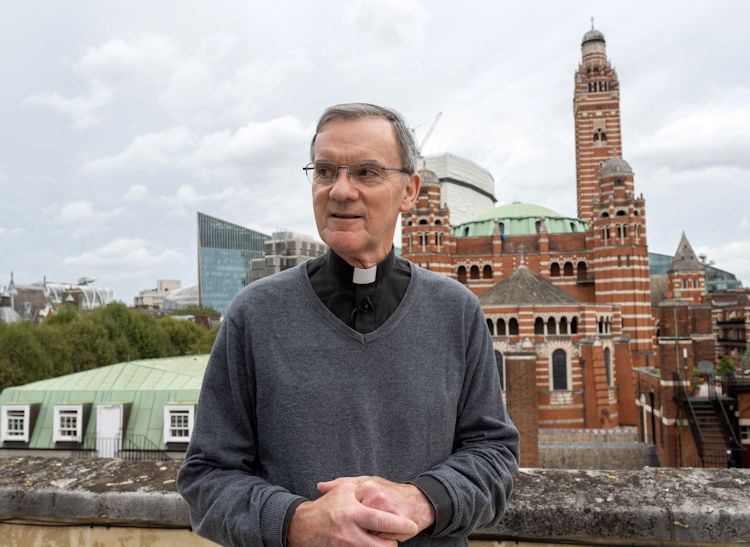Pope Francis plea on the global climate crisis is backed

Pope Francis recently published his Apostolic Exhortation called ‘Praise God’ or Laudate Deum, to further elaborate and finalize his efforts from 2015 in his Encyclical Letter, Laudato si'. In this particular document, he focuses on the importance of taking care of our shared home, and Bishop John Arnold has fully supported this message.
The Exhortation came out on October 4, which is the Feast of St Francis of Assisi, at the end of the Season of Creation.
Bishop John Arnold, who is in charge of environmental concerns for the Bishops’ Conference, commends the Pope's involvement as "essential" and "crucial."
I am glad to hear Pope Francis' message in Laudate Deum, which urges the global community to change our current destructive course. His words are both timely and prophetic.
He tells us to show gratitude towards God for every living being and emphasizes the importance of taking care of our environment, which is directly linked to taking care of one another.
According to Pope Francis, the choices that we make can cause serious harm not only to ourselves but also to future generations. We must take responsibility and take steps to care for our environment. Essentially, we are obligated to think about the impact we will have on the world after we have passed away (LD18).
The Pope discusses the impact of climate change on our planet in Laudate Deum. He characterizes it as a "silent disease" that affects everyone by causing drought, intense weather patterns, and high global temperatures. Throughout the Exhortation, the Pope stresses that this is a problem that affects the entire world and especially impacts those who are already impoverished. The climate crisis is a major issue facing our global community.
According to Laudate Deum, humans are considered as an integral part of nature. However, we have been recklessly mistreating this symbiotic role by taking advantage of the Earth's natural resources and minerals.
According to Pope Francis, people are a crucial component of nature. He suggests that humans should not be considered as independent, all-powerful, and unbounded creatures. Instead, we need to change our perception of ourselves to a more realistic and beneficial view that is more modest.
Bishop Arnold shares the same ideas, stating that the current climate emergency presents a chance for us to think deeply about the way we interact with the natural world.
Bishop Arnold believes that the manner in which we are currently living cannot continue. The situation is critical, and we require immediate political intervention worldwide to tackle this issue before it becomes irreversible. However, it's also pertinent that we reflect on certain things.
How do we view God's creation? Do we see it as a means for our financial gain, or a priceless present that we must safeguard? Are we caretakers of the planet, or individuals who take advantage of its resources for personal benefit?
The Pope, Francis, believes that it is important for countries to work together to create a new set of global rules to protect and preserve the environment, as well as help people thrive. He is worried about the slow progress made during past climate conferences and is already looking towards the next one in Dubai. He is urging everyone involved to stop just pretending to care and to have the bravery to make real changes happen. Time is running out and we need to act fast to prevent further damage.
Bishop Arnold expresses his disappointment with the absence of advancements made after the publication of Laudato si' five years ago.
The regrettable reality is that even after eight years and multiple COP conferences, we have not been successful in meeting the agreed targets, and the harm caused by climate change has not decreased. In certain aspects, it may even be worsening.
The Pope acknowledges the value of small actions in protecting the environment and recommends that households play a part in this by making efforts to decrease pollution and waste while also being mindful of their consumption habits. According to him, this shift towards a more responsible and sustainable lifestyle forms the foundation of a "new culture" that can bring about significant change.
Therefore, we must understand that although this may not have an instant impact from a numerical perspective, we are contributing to significant changes that originate from within society.
Bishop John Arnold shares the same sentiment and believes that we can push for more.
There are many ways we can improve our efforts. The main area we should concentrate on is education. The majority of parishes, schools, and Catholic groups are dedicated to being responsible caretakers, but we need to work together more effectively to ensure we are doing everything possible to undo the harm we have caused.
It is important that we keep moving forward and ensure that we have a say in our democratic country. We must be a voice that calls for a change in our nation's policies and way of life.
The leader of the Catholic Church, Pope Francis, concluded his speech called Laudate Deum by clarifying the motive behind the selection of its title.
This letter is called 'Praise God'. It means that when people try to replace God, they end up causing problems for themselves.
You have the option to peruse or obtain Laudate Deum directly from the Vatican.va website.
You have the opportunity to view a video featuring Bishop John Arnold discussing the critical state of climate change. The video can be found at the provided link.
The image shown depicts Bishop John Arnold. The photo credit goes to CBCEW/Mazur.

























































